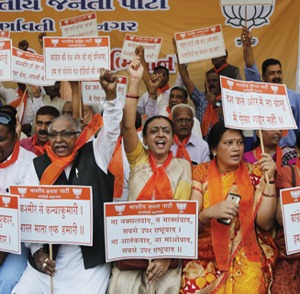So Tony Blair will be going at the end of June. It’s a shrewd decision since it means that he will still be leader during the international summit season, affording him a last chance to make his mark on the international stage – at least as an incumbant politician.
No doubt he was unwilling to pass up the opportunity to be head boy at the G8 conference in Heiligendamm, Germany on 6 June where, since Jacques Chirac will be gone, Blair will be the senior world leader. Then, later in June, comes the European Summit in Brussels, a chance to push for the new less ambitious treaty Blair thinks should substitute for the failed European Constitution (which would help wipe away the memory of the long-promised never-delivered referendum on the subject).
Both events will give him a last taste of life as a world statesman and offer a high-profile global shop-window for the “solver of intransigent disputes/after dinner motivational speaker” future he no doubt has mapped out for himself.
The next few months will see a deluge of Blair assessments and pundits will argue for years about his legacy, but for us he’s been at best a mixed blessing. No one, with the possible exception of Osama Bin Laden, has done more to bring the toxic certainties of religious belief back into politics and public culture, and this has had nothing but a destructive influence on our hard-won secular settlement. Ever since he surfaced – the young lawyer with the good hair and intense eyes – there’s been something of the evensong about him. Something earnest and preachy and frankly off-putting. What looked at first like a bold new vision, and certainly inspired devotion in a generation of voters and party hacks, turned out to be a mirage.
Tony Blair has dominated politics in this country for a decade and his preacherly tone has emboldened all manner of scriptural bureaucrats and self-appointed faith leaders eager for a public voice – from Iqbal Sacranie to John Sentamu to Cormac Murphy O’Conner – to believe that religion is squarely back on the agenda.
Politics, the balancing of competing claims and limited resources, the art of the possible, of compromise and consensus, has been fatally distorted by the reintroduction of Holy Book-inspired moral certainties, most egregiously in relation to the Iraq war. Though Blair never actually said “God made me do it,” all his talk of it being “what I believed to be the right thing,” and something for which he would be judged by his “maker” smacked of exactly the kind of divine certainty which underpins a crusade.
That a democratic leader feels he is answerable only to a supernatural being smacks also of a misunderstanding of how elections work. It could be that the country is gearing up to remind New Labour who does the judging.
Blair’s bowing to religious thinking and active support for the burgeoning of the faith industry in the political arena is having all kinds of negative consequences. Last issue we highlighted the way Blair’s City Academy policy provided a back door into education for religious special interests. This issue our cover story (page 14) reveals how bishops are now arguing for the continuation of their anachronistic and undemocratic presence in the legislature by suggesting that it is the idea of the separation between church and state that is the anachronism, and that, in the words of one Lord Spiritual, “the 21st century has seen an awakening of consciousness in public life of the importance of religion, faith and belief.”
That acceptance of religion as a benign political force is largely due to the style and disastrous faith agenda of our outgoing premier. Such new-found confidence in religion as an alternative to politics has become de rigeur internationally too.
Blair has found common cause with several leaders of putatively democratic countries who seem happy to accept scriptural explanations, and propose spiritual solutions, for critical social or environmental problems. George Bush’s response to the Virgina Tech massacre was to suggest that solace, and the resolution of the battle between good folks and baddies, lies in prayer rather than, say, a frank discussion of American gun laws. In Australia John Howard, another active Christian who has overseen the return of religion to the public sphere, has spent years pooh-poohing climate change warnings only to find his country facing the most serious drought in its history. His solution? “Pray for rain”.
Back in Britain we look forward to the end of the Blair era signaling an end to the fallacious idea that the solutions to the intractable problems of the current time – inequality, social disengagement, environmental disaster – are to be found through prayer or divine intervention, rather than in the grubby, compromised human world of real democratic politics and evidence-based argument.
We don’t yet know what Gordon Brown might do with the faith agenda, or how long he might have to do it. But we hope he, or whoever in the long term comes after Blair, has noticed that the British people don’t like preaching. ■

